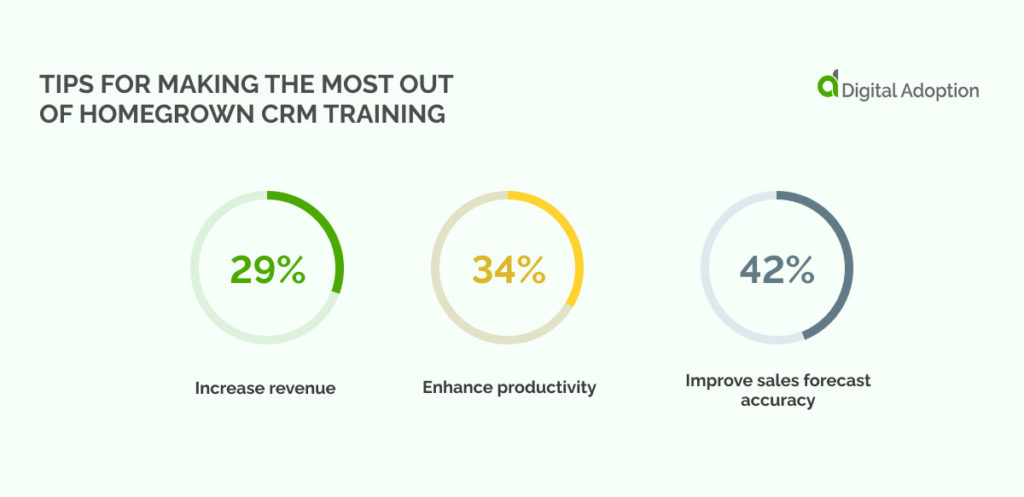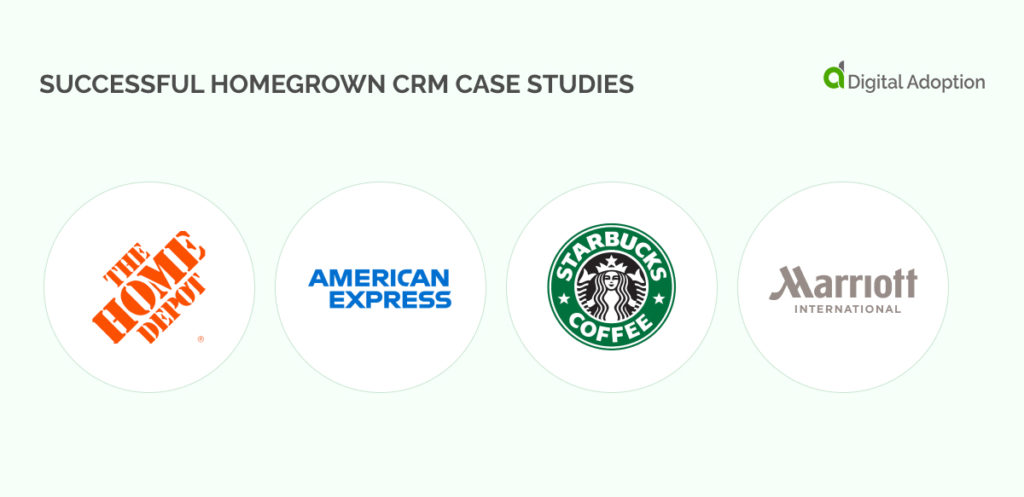Homegrown CRM systems offer powerful and feature-rich functionality that can be utilized to deliver a more streamlined customer experience. Organizations can benefit from a homegrown customer relationship management (CRM) system from large-scale to small-business operations. Unfortunately, not all businesses will find the perfect system that covers their needs on the market. For those highly particular organizations with unique criteria, crafting a personalized CRM from the ground up is critical to attaining peak performance.
The digital adoption of custom CRM systems is on the rise, and learning how to create, deploy and maintain your own from scratch will give you a leg up in today’s tech-driven economy. Moreover, rapid digital transformation (DX) has given agency to organizations and businesses that seek increasingly personalized and bespoke solutions previously unattainable. Homegrown CRM systems are a key component of this digital revolution, providing the flexibility and customization necessary to remain competitive.
However, a unique approach to employee training may be required to become proficient in using custom systems. As such, the most efficient way forward is to invest in tailored CRM training that delivers optimal business outcomes.
Statistics from Grand View Research estimated the global value of the customer relationship management market to be worth 58.82 billion dollars in 2022. The research and consulting firm forecasts the global CRM market share will register a CAGR of 13.9 percent between 2023 and 2030, exceeding 160 billion dollars in value by 2030.
This article will provide an overview of how organizations can launch effective training mechanisms for navigating a homegrown Customer Relationship Management (CRM) system. It covers the fundamentals of designing and executing successful CRM training programs and tips on best engaging learners while outlining strategies for creating effective learning materials and activities to help users understand how to use the CRM system efficiently.
- What Is Homegrown CRM Training?
- Why Invest in Homegrown CRM Training?
- How to Coordinate Effective Homegrown CRM Training?
- How Can Homegrown CRM Training Help Your Business Grow?
- Understanding The Homegrown CRM Training Processes
- The Benefits of Homegrown CRM Training Over Traditional CRM Software
- What Are The Barriers Impeding Successful Homegrown CRM Training?
- How To Get Started With Homegrown CRM Training
- Tips For Making The Most Out of Homegrown CRM Training
- Successful Homegrown CRM Case Studies
- What’s Next For Homegrown CRM?
What Is Homegrown CRM Training?
Homegrown or custom CRM training is a tailored education program designed for organizations that have decided to build their own CRM system instead of buying an off-the-shelf solution.
This type of learning provides employees and stakeholders with the skills they need to use the in-house CRM software so that it can be used most effectively and efficiently. Any business’s lifeblood lies in its customer relations strength, which is why Customer Relationship Management (CRM) was invented.
By utilizing this technology, organizations can guarantee a seamless exchange between them and their customers to promote growth and success. The essential goal of in-house CRM training is to arm people with the information and capabilities they need to comprehend how their organization’s unique software functions, helping them navigate it quickly and conveniently.
Why Invest in Homegrown CRM Training?

Overcoming the learning curve is expected when an organization and its employees adopt new technologies, such as a CRM system. Training barriers can further compound when original bespoke CRM systems are implemented without the appropriate educational parameters to guide employees toward successful digital adoption.
Custom-made CRM systems are designed to channel their energy into the organization’s required features, so users only have to learn what is necessary for them. Investing in a homegrown CRM training program is essential to ensure that employees can quickly and effectively integrate CRM into their workflow while reaping the benefits of their proprietary systems.
The main benefit of launching comprehensive employee training for proficiently using homegrown CRM systems is that it creates an environment to quickly and efficiently create value. This can be further achieved by ensuring that the training is tailored to the specific organization, considering the nuances of their bespoke CRM system.
Other benefits of investing in an effective homegrown CRM training program include the following:
- Increased employee productivity
- The ability to quickly launch new processes and functionality
- Reduced customer churn due to enhanced customer service
- A deeper understanding of how to use the CRM system
- Improved customer loyalty
- An increased chance of employees reaching their full potential and working smarter rather than harder
- Increased data accuracy
- Reduced cost of operations
How to Coordinate Effective Homegrown CRM Training?
Coordinating and launching practical homegrown CRM training programs requires careful consideration of the end user’s needs. CRM training implementation should be tailored to the organization’s unique objectives, core processes, and systems, and training programs must consider the end user process to maximize benefits and minimize disruption. The training should give users a thorough understanding of navigating and using the specific CRM system for their organization and its associated processes.
Consider the following when implementing your own custom CRM training program:
- Who are the intended trainees? (employees, customers)
- What skills do they need to learn?
- What challenges/barriers are they likely to encounter while using the CRM system?
- What resources will be needed for learning and onboarding?
Once those questions have been answered, you can move on to designing the training program itself.
How Can Homegrown CRM Training Help Your Business Grow?

Homegrown CRM training can provide a variety of benefits for your business. It can help employees become more productive, increase customer loyalty and satisfaction, reduce costs associated with operations, and improve overall data accuracy. All of these factors can contribute to improved performance and higher revenues.
Furthermore, investing in homegrown CRM training will ensure that your employees are equipped with the necessary skills and knowledge to effectively use the system, which can lead to increased customer retention and satisfaction. The more efficient your employees become, the more value they offer your organization.
Enterprise Resource Planning (ERP) training is also beneficial for businesses, as it can help you to better manage and track performance. ERP systems provide a unified platform for all departments, processes, and resources. This can help to improve communication between teams, reduce errors in data entry, and increase productivity across the board.
To understand your customer base and remain competitive, Enterprise Resource Planning (ERP) and Customer Relationship Management (CRM) offer invaluable yet interconnected data systems. Both provide detailed analyses that allow you to craft comprehensive strategies to advance in the marketplace.
Understanding The Homegrown CRM Training Processes
To ensure that your training program is successful, you need to consider the following processes:
Creating the right learning materials – Suitable materials are essential to ensure users understand how to use the system efficiently. This includes videos, tutorials, infographics, and even written documentation.
Choosing engaging activities – To retain user attention, engaging activities such as quizzes, games, and simulations should be included in the training program.
Setting up a schedule – A well-planned schedule of learning sessions can help ensure that users are properly trained on the system before using it.
Evaluating progress – To assess how well the training is going, you should use surveys and assessments to evaluate user progress.
Providing ongoing support – Finally, post-training support can help ensure that users stay up-to-date with any changes or new features made available in the system.
The Benefits of Homegrown CRM Training Over Traditional CRM Software
Compared to traditional CRM software training methods, homegrown CRM training offers several advantages:
- It is tailored to the organization’s specific needs, so users don’t have to learn a lot of unnecessary features
- The training program can be tailored to different user levels and roles within the organization
- It allows for greater customization and integration with existing systems
- It is often more cost effective than traditional CRM software
- It provides a better understanding of the company’s processes, making it easier to improve them over time
Overall, homegrown CRM training offers an effective way to quickly and easily get your employees up to speed on the CRM system quickly and easily. It ensures that users understand how to use the system efficiently and allows them to gain valuable experience with the software before it goes live.
There is no need for complicated CRM vendor arrangements. As a result, businesses can get more out of their investment in the CRM platform while also gaining a competitive edge over their competitors.
What Are The Barriers Impeding Successful Homegrown CRM Training?
Despite the many benefits of homegrown CRM training, there are potential barriers to success. These barriers are a major issue, as custom CRM solutions are designed to meet an organization’s specific needs and may include complex tools and processes.
Other barriers to successful homegrown CRM training include:
Limited resources – Depending on the size of your organization and its budget, you may need more resources to invest in a comprehensive CRM program.
Lack of knowledge – If your staff doesn’t already have experience with the software, they may find it challenging to learn how to use it.
Time constraints – If you don’t have enough time to develop and implement a training program, it can be difficult to get users up to speed in a timely manner.
Unclear objectives – It can be hard to measure success without clear goals or objectives for the training program.
Poor leadership – If a weak leader oversees the training, users may not receive adequate guidance.
These barriers can make it difficult to ensure that your homegrown CRM training is being implemented correctly. However, by addressing these concerns, you can ensure that your training program is viable. The right training program provides that your staff is up-to-date on the latest features and can get the most out of their investment in the software.
How To Get Started With Homegrown CRM Training
If you’re considering investing in homegrown CRM training for your organization, the first step is assessing your current needs and resources. Consider budget, time constraints, user knowledge levels, and objectives.
Once you understand these factors better, it will be easier to plan out the details of your training program. Create a timeline, assign roles and responsibilities, and decide on the type of training materials that will be used.
Then, reach out to experts who can guide you in creating a successful CRM training program. Experts can advise on best practices, help develop custom solutions for your organization’s needs, and ensure that the training program aligns with your organization’s goals.
Finally, create a system for regularly assessing the training program’s success and making any necessary improvements. This will help ensure the program is constantly updated to meet your organization’s and users’ changing needs.
Tips For Making The Most Out of Homegrown CRM Training

Salesforce statistics suggest that utilizing customer relationship management applications can exponentially increase revenue by 29%, enhance productivity by up to 34% and improve sales forecast accuracy by an outstanding 42%. Creating an environment that encourages learning is the key to making the most out of homegrown CRM training and changing an organization’s culture.
Here are a few tips for accomplishing this:
- Make sure everyone has access to the same information by providing users with clear instructions and resources, such as user manuals, help articles, and video tutorials
- Utilize hands-on learning and pair novice users with experts to quickly get them up to speed
- Promote collaboration that encourages users to engage and share their experiences
- Tailor training to individual needs and customize the training program to meet the needs of different user groups, such as technical or non-technical users
- Keep it fun and incorporate engaging activities and multimedia elements to keep users interested.
Successful Homegrown CRM Case Studies

Case studies are a great way to learn from the successes of other organizations.
To illustrate the potential of homegrown CRM training, let’s take a look at a few case studies:
1. Home Depot
Home Depot used CRM training to help manage customer relationships and increase sales. Home Depot’s training program was effective in assisting them to enhance customer service, increase productivity, and improve reporting capabilities.
2. American Express
American Express used Homegrown CRM training to improve customer experience. The Homegrown CRM training program enabled American Express’s sales teams to better understand and respond to customer needs, develop targeted offers that resonated with customers, and increase customer loyalty.
3. Starbucks
Starbucks Homegrown CRM training helped store managers better understand customer needs. The Homegrown CRM training enabled Starbucks to identify customers with higher value and tailored offers accordingly. This ultimately led to an increase in sales for Starbucks.
4. Marriott International
Marriott International used Homegrown CRM training to help create a more personalized customer experience that enabled them to identify customer preferences and suggest activities that interest them. Their proprietary CRM training helped the hospitality company implement personalized offers and increase customer loyalty.
What’s Next For Homegrown CRM?
As the demand for better customer service and data management continues to increase, so does the need for enhanced CRM training—homegrown or otherwise. To keep up with these changing requirements, organizations must continue to invest in quality CRM training programs. These should cover best practices, user experience design, custom solutions, and more.
Consequently, companies can enjoy the advantages of experienced users knowledgeable in all the latest developments to strengthen their client relationships and advance leads, prospects, and possibilities down the sales funnel.
Statistics from WalkMe reveal that by 2012, most companies still needed to take full advantage of their CRM software, which offers a return on investment of $5.60 for every dollar spent. Research also reveals only 20% of businesses were tapping into the true potential this system could offer them.
Investing in homegrown CRM training effectively ensures that users have the knowledge they need to make the most of their software investments. With the right program, businesses will be well-positioned to take advantage of new opportunities, disrupt business processes and drive growth for years.
Ultimately, homegrown CRM programs are essential for any organization looking to get the most out of their CRM software. By investing in comprehensive training, businesses can ensure that their sales teams and software developers have the skills and knowledge necessary to make the most out of their investments.













